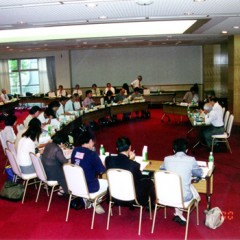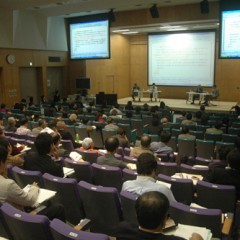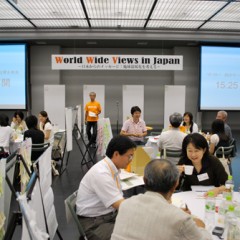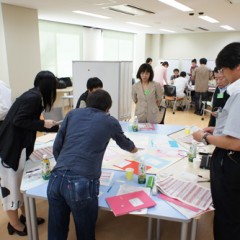The Consensus Conference to Consider Genetically Modified Crops was the first consensus conference in Japan sponsored by the government. With the recent developments and advancements in genetic engineering technology and its application to crops, the technology’s safety and use are also being addressed in debates. However, because citizens’ anxiety and distrust regarding genetic engineering technology remain unresolved, at this conference, the effect of genetic engineering technology on people’s health and the environment was scientifically demonstrated. Furthermore, a Citizens’ Thoughts and Proposals report was created to respond to citizens’ concerns. Through this conference, we sought a two-way exchange of opinion between citizens and specialists regarding methods to assess the potential of genetically modified crops as well as issues demanding consideration when proceeding with research and development in the future. The Characteristics of the conference are as follows:
■ “Citizens,” not experts, produce consensus.
■ Dissemination of this consensus to society.
The Open Dialogue Forum on Nuclear Issues was designed as an attempt to have an engaging discussion on nuclear power technology while avoiding unproductive disputes. Diverse problems relating to nuclear power technology require consensus in society, such as spent nuclear fuel reprocessing plants, highly radioactive waste, and earthquake resistance. However, although dialogue forums for public participants with differing opinions to debate complicated issues are dramatic, situations can easily arise in which public participants cannot calmly state their opinions. Seeking mutual respect and calm exchange of opinions, fairness was a major theme of the Open Dialogue Forum on Nuclear Issues. In addition, the forum aimed to examine how to facilitate communication between experts who have different opinions regarding nuclear technology.This open dialogue forum facilitated the sharing of information among participants to formulate decisions regarding the implications of continuing or ceasing to use nuclear power, and it adhered to the following principles:
■ Participatory role based on the space (dialogue rules).
■ Investigating the nature of spaces for fair dialogue.
World Wide Views on Global Warming was a worldwide citizen conference on issues relating to global warming. This conference was held in various countries and localities on the same day, addressing the same questions, based on the same information, and using the same method. World Wide Views emerged to transmit the voices of citizens around the world to the 15thConference of the Parties to the United Nations Framework Convention on Climate Change (COP15), held in 2009 in Copenhagen. In Japan, it was held in Kyoto, the site of the adoption of the Kyoto Protocol, under the auspices of the Executive Committee of World Wide Views in Japan. Policies regarding not only the problem of global warming but also general environmental problems exert a considerable influence on our lives. Therefore, we require spaces in which citizens can become involved before determining these policies.
■ Discussions used the same method based on the same materials on the same day.
■ A public consultation was held in preparation for COP15.
The Deliberative Caravan sought new issues and directions for responses to new science and technology such as regenerative medicine. It was designed as a space in which a diverse set of people—specialists, policy makers, citizen action groups, and individual citizens—could engage in discussions. The focus of the Deliberative Caravan was not policy proposals but (1) proposing an agenda of questions to be discussed in society for the practical use of new science and technology and (2) planting new seeds for debates in society. The agendas formulated in the Opinion Eliciting Workshop and the Agenda Formulation Meeting were used in surveys of society, proposed to academic societies and governments, and employed for other purposes.
■ Agenda formulation based on cooperation between citizens and specialists.
■ Participatory technology assessment based on networks.








